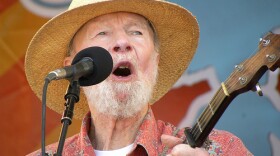Pete Seeger is gone. I first met him at Buck’s Rock Work Camp when I was 14. He was standing on the big cement porch, surrounded by kids. After hearing him, nothing was the same. He was my lifelong hero. I had few others. I wasn’t alone -- many of you first heard Pete at camp or school. That’s how he made his living during the time he was blacklisted.
I’d borrow The Weavers at Carnegie Hall and The Weavers on Tour from the Donnell Library and listen until I knew every song by heart. I learned how to play the banjo from Pete’s “How to Play the Five String Banjo” book. I literally dreamed about meeting my hero one day. Once as a college student, a famous critic wrote a lousy review of a Pete concert in the Times and I wrote a letter of complaint to the editor. I received a note from the writer but I blew my gut because they had not printed my letter.
As a teenager, I would write Pete letters and either he or his wonderful wife Toshi would always respond. When I worked as a music counselor at the Bronx House Camps in nearby Copake, I would sing Pete’s songs. I remember taking a day off to return to the Ocean Beach Fire Island Youth Group where I would play banjo with some friends for the kids there. One of them, Bobo Peck, told me of taking Pete out for a sail and telling him the story of how I had changed Pete’s song Abiyoyo and made up a whole different story. When I picked up my copy of Sing Out! Magazine I was astounded to find that Pete had written a whole column about how I had changed the song around. It truly didn’t get any better than that. He called it the “folk process” and while he didn’t know or use my name, it was me alright. Years later when I first met Pete I told him that he once wrote an article about me in Sing Out! and without hesitation he said, “You’re the guy.” I couldn’t believe it.
Naturally, I went to every Pete concert I could. They would put a little notice in the paper and a few days later every seat was gone.
WAMC’s very fund drive featured one Pete song after another. When things got slow we would play, “We Shall Overcome,” or “Bring Them Home.” And then we got really lucky. In 2002, we called Pete and he agreed to sit down to talk about his life. We offered that recording as a premium and the rest is history. By the time we were through, we had a series of six tapes that have brought tens of thousands of dollars into the station. He was so modest. When I told him, how much money had come into the station he couldn’t believe it. “All that money,” he said.
Maybe a year ago I had a call from Pete’s collaborator, Lorre Wyatt, who said, “Pete wants to do something for WAMC” and that led to one of his last concerts. It was the first time Pete had been back musically to Peekskill, New York where he and Paul Robeson had been attacked as police looked on and did nothing.
Well into his 90s, Pete could be seen out on his land, chopping wood. One day Lorre Wyatt came into the station and handed me a log. “Pete told me to give you this,” said Lorre. I looked at the wood which is standing on a table in the middle of my office. On it is written, “To Alan and our extended WAMC family. Together we will keep the flame alive.” Pete signed it with his name and the little banjo he always signed with. I am grieving. There will never be another Pete.




